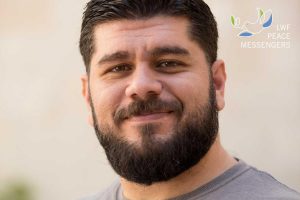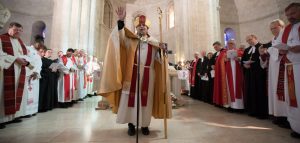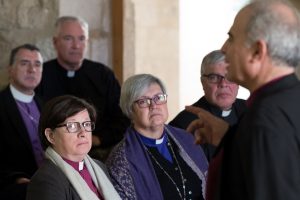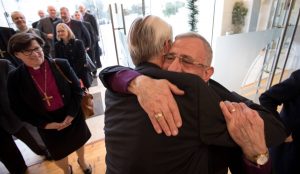Resurrection Joy in a Fearful World
From Bishop Dr. Munib Younan
Matthew 28:5-8
“The angel said to the women, ‘Do not be afraid; I know that you are looking for Jesus who was crucified. He is not here; for he has been raised, as he said. Come, see the place where he lay. Then go quickly and tell his disciples, He has been raised from the dead, and indeed he is going ahead of you to Galilee; there you will see him.This is my message for you.’ So they left the tomb quickly with fear and great joy, and ran to tell his disciples.”
***
Alleluia, Christ is risen! Christ is risen indeed, Alleluia! Al-Masih qam! Hakkan qam!
Dear sisters and brothers in Christ, on Palm Sunday morning, after being in church and feeling encouraged by the message of “Hosanna!” sung by the children and the congregation, I heard the sad news of the massacre of our sisters and brothers in two churches in Egypt. One cannot receive such horrific news except with tears. The feelings of great joy on our feast day, and great sadness over such a horror, are inseparable as much as the great joy and great fear of Mary Magdalene and the other Mary were inseparable as they ran from the empty tomb.
And so I must confess that as I prepared this Easter message from Jerusalem, the city of the crucifixion and resurrection, to the whole world, I had some doubts in my heart. I thought: What message can I bring this year that is different from past years? Has the Easter message lost its meaning, disregarded by Christians as well as others? Is it just a message of idealism, far from the lived experience of people today? What does the resurrection of Jesus have to say to us in the midst of the terrors, chaos, and uncertainty of today’s world?
But then I remember that the life of faith is not always one of assurances or certainties. Jesus’ own disciples struggled to understand his teachings and his journey to the cross. Peter denied Jesus three times. The guards at the tomb were so afraid that they became “like dead men.” Mary Magdalene and the other Mary ran from the tomb with fear and great joy. And on the walk to Emmaus, the disciples did not recognize the risen Christ until the breaking of the bread.
Therefore, there is no shame to admit that here in the Middle East it is a very challenging time to proclaim and live the Good News of the resurrection of Our Lord Jesus. The struggles we are facing are very real and are becoming even more complicated. We have good reason to feel confused! And still, the message of Easter comes to us very clearly: Christ is risen! The powers of sin and death have been defeated! And as the angel of the Lord has promised, the risen Christ now goes before us to lead the way in this broken and often frightening world.
I think of the story of St. Augustine, who was full of doubt but prayed earnestly for the gift of faith in God. While he was praying, he heard the voice of a child saying, “Pick it up and read! Pick it up and read!” He thought this could be the Lord telling him to read the Holy Scriptures, so he searched and found a Bible. Then he opened it and read the first verse he saw, from the Letter of Paul to the Romans: “Put on the Lord Jesus Christ, and make no provision for the flesh or the gratification of your desires.” (Romans 13:14) The young Augustine read no further, for there was no need. He later wrote: “No sooner had I reached the end of the verse than the light of certainty flooded my heart and all dark shades of doubt fled away.” (Confessions) Thanks be to God, the risen Christ always comes to us when we are full of doubt, and shows us the way of love and light! For this reason, even in the midst of our confusion and sadness over the killing of innocent Christians at prayer, we can say with certainty: There is no religion which accepts the killing of innocent worshipers, who were doing nothing but seeking closeness with God. These acts are untenable and unaccepted in any religion. We are grateful that the vast majority of Muslim friends also stand with us as equal citizens against such horrors.
Today we are also facing a horrible and confusing situation in Syria, in Iraq, and across the Middle East. We see the images of chemicals stealing the breath from children, and of cities lying in rubble, and we wonder, “What can we do?” At the same time, we see missiles flying and we are afraid of what comes next for Syria, and for the whole Middle East.
And again, although we may feel confused, because we have seen the risen Christ we know one thing for certain: Syria has no need of more weapons, more violence, or more massacres, or more extremism from anybody. This is creating international tension, straining relations between friends and partners, and we are afraid of what comes next. I urge world leaders to hear the words of Jesus to Peter in the Garden of Gethsemane, after Peter had cut off the ear of the high priest servant: “Return your sword to its sheath! For those who live by the sword will die by the sword.” Violence breeds violence, whether it is committed by terrorists or by governments. I call on the leaders of the world: Return your swords to their sheaths! Bring instead peace based on justice to Syria, to Iraq, to Palestine and to the whole Middle East. Bring a future for us and for our children.
As Christians in the Holy Land today, the turmoil in these many neighbor countries is very frightening. At the same time, here at home we are in our fiftieth year of occupation. Many Palestinian Christians are asking, “How long, O Lord? When will this end? Where do we belong?”
For this reason, I feel it is important to acknowledge that even as we sing our joyful “Hallelujahs” and celebrate Our Lord’s victory over death, some fear and confusion and doubts still remain. And yet, we must remember that we are not alone. These are the very same feelings the disciples felt after the resurrection of Jesus.
When our Lord was raised on that resurrection morning, the earth shook, an angel arrived in a flash of lightning, and the stone rolled away from Jesus’ tomb. It seemed the very foundations of heaven and earth had shifted. What we proclaim today as Good News, at that time was only confusing, frightening news! The guards, the women, and the disciples were all afraid of what they saw and heard. They were all afraid of what would come next. They wondered what the resurrection meant for their lives. And yet, this same earth-shaking event is the one that gives us hope today. The powers and principalities of sin and death could not overcome the love of God. Yes, they could crucify Jesus. Yes, they could bury Jesus. But they could not bury God’s love for the world!
In the midst of their confusion, the angel told the ones gathered at the tomb, “He is not here, He is risen! He is not here, He is risen!” In the midst of bombings, Christ is risen! In the midst of persecution, Christ is risen! In the midst of violence and occupation, Christ is risen! In the midst of poverty and sickness, Christ is risen! In the midst of war, Christ is risen! And in the midst of our families, our communities, and our churches today, Christ is risen!
This is our hope, and we must cling to it. The message of Easter is not idealism. Christ’s victory over sin, death, and despair, is the only hope that has kept Christians steadfast in this land for two thousand years. It is the only hope that carried the saints of every age through trials, struggles, and persecutions. And it is the only hope that today will carry us through these confusing times in the Middle East and throughout the world. The Good News of the resurrection gives Christians clarity and purpose, no matter where they are, and no matter what the future brings. Jesus, the Morning Star, goes before us to lead the way and the Way of Jesus is always the way of peace, justice, mercy, healing, reconciliation, respect for diversity, and living together as one people of God.
Therefore, Palestinian Christians will continue to be steadfast in our land. We will continue to carry the message of resurrection in the face of all who promote a culture of death. In the midst of power struggles, political maneuvering, and the growth of extremism in our world, we will only proclaim the culture of life and life abundantly, will full dignity for every human being.
As we celebrate Our Lord’s victory over death, in this 500th year of the Reformation, let us trust that Jesus Christ’s crucifixion and resurrection have already liberated us by grace. We are not afraid! Despite all troubles and tribulations, let us go out from our churches and into the world with the joy of the resurrection, knowing that the risen Christ goes always before us. Let us encourage one another with the two-thousand-year-old Easter greeting of Jerusalem:
Hallelujah! Christ is risen! Al-Masih qam! Hakan qam!
For more information contact Adrainne Gray at agray@elcjhl.org and visit www.elcjhl.org
Text provided by the ELCJHL




